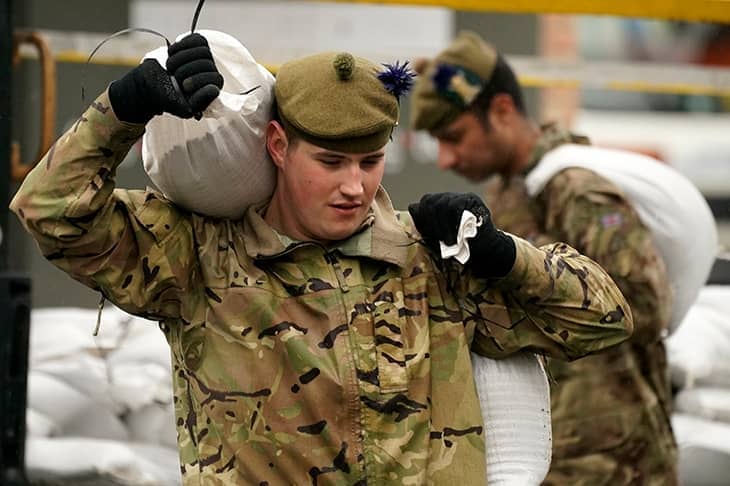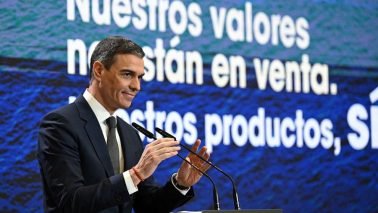Flood relief
Sir: In my lifetime there have been at least two major flood emergencies when the armed forces have played a key role: the 1947 floods, and the East Coast storm surge in 1953 (Leading article, 4 December). Both of these major catastrophes required large inputs of manpower and machinery. We should remember that National Service was in operation then, and because the second world war was so recent there was an innate sense of collective responsibility and discipline which extended to the many volunteers who came forward to help.
Disaster and emergency response and relief is a highly interconnected activity, requiring many different roles and responsibilities. Flood-watching is only a minor part; throwaway lines such as those in the recent government plan about utilising troops on flood watch must not be allowed to go unchallenged.
James Dent
Brent Eleigh, Suffolk
National emergency service
Sir: Your leader says: ‘If we need a national resilience force to deal with pandemics, floods, supply-chain issues and myriad other problems, then we should create one rather than trying to turn the army into that.’ But surely using the army as an additional emergency service in national emergencies makes complete sense in every way, particularly economically. Assuming we are not at war, these units would usually be on training and exercise programmes. What could be better training, or better for soldiers’ morale, than helping to restore normality to civilians who have been hit by storms, floods or other misfortunes?
Elizabeth Francis
London SW3
Tory blues
Sir: James Forsyth identifies many of the shortcomings of the present government (Politics, 4 December) but neglects to mention the two elephants in the room: Covid and green energy. In my neck of the woods, no one cares about what should or shouldn’t have been done regarding Owen Paterson. What deeply concerns me, my family and friends is the government’s continuing quixotic and blinkered response to the coronavirus, and the likelihood that our efficient heating systems will shortly be taken from us. These are people who all voted Conservative in 2019; now we’re fervently hoping for an alternative.
John Rowlands
Ross on Wye, Herefordshire
Czech facts
Sir: Commenting on the state of rolling stock around Darlington, Rod Liddle implied that Czechoslovakian locomotives were somehow second-rate (‘Keeping up appearances’, 27 November). I’d like to remind him of CKD and Skoda, the leading machinery manufacturers in Central Europe since Austro-Hungarian times. Czechoslovakia was already manufacturing the electric Class E499 when British Rail introduced the steam-powered Class 5 in 1951. Mitteleuropa remains the apogee of rail travel in the world, with regular and cheap services across the region, hotel-like night trains and dining cars with freshly cooked schnitzel and draught beer. Rod Liddle should think twice next time before comparing the Czech rail service to that of County Durham.
Jan Nedvidek
Prague
McIndoe, my hero
Sir: I welcome the praise for the treatment of burned aircrew during the second world war at RAF Hospital Rauceby (Letters, 4 December). May I also mention RAF Hospital Cosford? I shared a room there with Bill Foxley, the worst burned flyer in the war. Sir Archibald McIndoe visited and stood at the end of my bed when agreeing that my feet should be amputated. Bill and I were both subsequently moved to McIndoe’s unit at East Grinstead. I remember in my Cosford hospital euphoria looking up from my bed and feeling that Sir Archibald was the sort of man that you would walk over the edge of a cliff for.
Sam Gallop CBE
Chairman, the Guinea Pig Club
Ruling the waves
Sir: Perhaps because he was brought up in one of the very few British colonies without a coastline, Matthew Parris (‘Anticolonialists have their myths too’, 4 December) has overlooked the principal difference between the British and the other empires he considers. Most of the rest were founded on military power; the British Empire was the product of naval power. This enabled the British to give several extraordinary gifts to the world: the freedom of the seas and the abolition of the Atlantic slave trade being two of them. The Empire also provided a worldwide trading network which enabled tiny settlements like Hong Kong and Calcutta to grow into prosperous cities that lifted millions of local people out of poverty.
John Gordon
Wylye, Wiltshire
Jumbled memories
Sir: Robin Aird (Letters, 4 December) likens the retrieval system of memory to a jukebox. This reminded me of Sherlock Holmes, who considered a brain to be ‘like a little empty attic, and you have to stock it with such furniture as you choose… it is of the highest importance, therefore, not to have useless facts elbowing out the useful ones’. How wonderful if that were so!
Peter Fineman
Mere, Wilts
The right to night
Sir: In light (apologies!) of Melissa Kite’s street lamp frustration (Real life, 4 December), may I commend my local authority, Epping Forest District Council, as a beacon of common sense on this issue? Street lights are turned off at midnight where I live, out of respect for the forest’s wildlife. Perhaps the council could illuminate others by its example..
Basil Vincent
Loughton, Essex






Comments